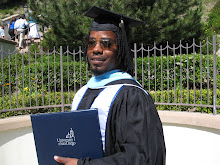


Three years ago, the summer of 2007 i visited Apam. Many of us came with gifts of school supplies and books. The chief wanted us to present the items to the school when it opened back up for session in September. Unfortunately, that year we weren't able to present at that time because we were all due to be back in the states. So the chief held on to the items for the following year of 2008 to have at least one of us present the items. Although i was there again, I to was unable to present because it was the vacation months of school. Well, the chief held on to the books and supplies another whole year till someone could come and present them to the school. I thought this was great! So i made it a point to come back this summer of 2009 and present the items to the school during the actual school session in Apam. The items were there so long that Nana had forgotten where some of the items were. When he found the items himself, he brought them down to Royal Prep School for me to finally present to the kids and staff. Nana Apaa (Chief of Apam) wanted the students to see those who had a part in giving to them. This was a good lesson for me and the students. Mr. Quaye happily shook my hand and accepted the gifts and was so thankful. You can see some of the kids reading the books before we were set up to take the picture. There were many stories to read from the sciences to slavery in America. The kids couldn't wait to start using the materials. I loved seeing the students eager to read the books. I know this experience will go a long way with them.















